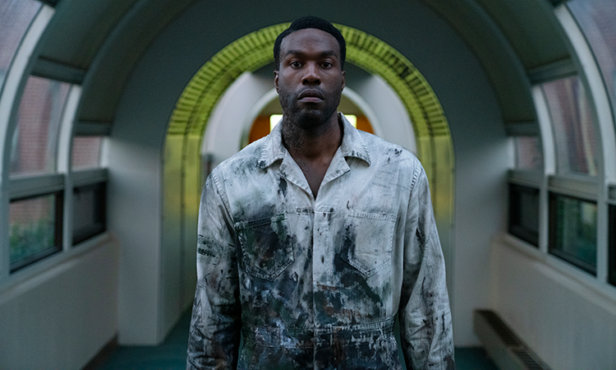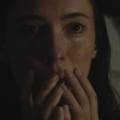This impeccably directed ‘spiritual sequel’ to Bernard Rose’s uniquely chilling 1992 urban legend slasher (based on Clive Barker’s story ‘The Forbidden’) cuts close to the original by building on and excavating its themes from a fresh perspective. Director Nia DaCosta sets up a visually striking and disturbingly creepy ambience right from the start, with the studios’ opening logos inversed and Rose’s aerial shots of Chicago shot from the opposite angle looking up at the imposing skyscrapers and expensive apartments that have replaced the Cabrini Green housing project which was gradually decimated from the mid-Nineties.
The original film centred on white academic Helen Lyle (Virginia Madsen) stepping into the housing project to investigate the titular bogeyman played by Tony Todd. This bold reimagining follows on from that first film in 2019, ignoring the sequels, to tell a new, but connected story about Black artist Anthony McCoy (Yahya Abdul-Mateen II) who becomes obsessed with the Candyman when he starts to delve into the history of the area. Anthony has recently moved to a fancy new apartment with his girlfriend and gallery curator Brianna (Teyonah Parris), and their relationship starts to suffer after he summons the spirit of Candyman by saying his name five times in the mirror.
Remnants of Cabrini Green still exist, and they are used to great effect in the sequel with the tall city buildings looming ominously over the boarded up homes like an unstoppable force speaking to the oppressiveness of gentrification. The setting is one of the many multiple layers examined, and slowly peeled back to reveal the racism and violence baked into the fabric of American society. This exquisitely crafted film brings a history of collective trauma, cultural appropriation and institutional discrimination to the surface with effectively biting and often laugh-inducing satire, macabre body horror and a slow-building, nerve-wracking tension.
The score by composer Robert A. Lowe warps familiar sounds, and the remix of Philip Glass’s unforgettable theme, Music Box, offers up deliciously twisted new delights. DaCosta’s beguiling shadow puppetry plays intermittently, filling the audience in on the mythology and the way she navigates the architecture of glossy towers, inside and out, and uses numerous mirrors with inventive flair for the kills, is to die for.
The screenplay co-written by Get Out’s Jordan Peele, Win Rosenfeld and Nia DaCosta may try to fit in too many threads, but the way it reframes the original story to reflect on the horrors of the past and a relentless cycle of violence is compelling and provocative. Taking place in the modern art world Candyman not only pours scorn on white gatekeepers, critics and oppressors, it steps through the looking glass to scrutinise storytelling and the creative process.
Candyman is out now in cinemas.

